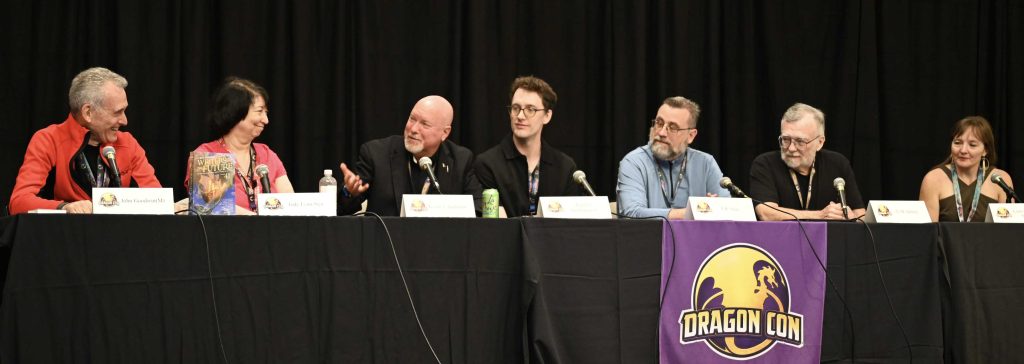
Authors Kevin J. Anderson, Jody Lynn Nye, and S.M. Stirling, distinguished judges of the Writers of the Future (WotF) contest, joined recent winners Randyn Bartholomew, Lauren Catherine McGuire, and T.R. Naus for the panel “Writers of the Future: Practical Skills/Insider Knowledge for Genre Fiction” at 1PM Saturday in Hyatt International North, to share tips on how to succeed as a writer. Moderator John Goodwin noted that this year, Writers of the Future will publish an impressive 1,000th new author in their annual anthology—L. Ron Hubbard’s way of paying it forward.
The first topic the panel discussed was how to develop an idea into a story. Nye suggested looking at geography and how it affects culture, weather, and societal interactions. History is a rich source of ideas. Anderson pointed out the importance of having to tell the story, and introduce characters and setting in a short time. “Evoke the setting,” he advised. Give a few details the reader can use to imagine the world you’re trying to portray. Travel and explore different places to help your creativity.
Bartholomew tries to highlight the differences between our world and his, which helps make each word count. Stirling advised using all four senses to orient the reader quickly and vividly. McGuire shared how much she appreciated Nye pushing her to develop her use of the senses, which improved her writing.
After noting the value of reading the winning stories in this year’s anthology, L. Ron Hubbard Presents Writers of the Future Volume 41: The Best New SF & Fantasy of the Year, panelists discussed the importance of being an avid reader. Reading in the genre, Nye said, helps you see what’s out there. “Science fiction/fantasy fans are more sophisticated than the average reader,” she added. Stirling agreed. When literary writers attempt to write SF/F, he pointed out, they usually come up with “something invented 50 years ago.”
Anderson suggested reading widely. “The more you read, the more you learn,” he said. “You can’t only read SF because then you’re only using leftovers.” He suggested reading successful authors in other genres—Dean Koontz, for example. You can use his techniques to add suspense to your story. Bartholomew likes reading poetry for the “sensitivity of language.” It’s important to know the tropes, Naus said, so you can avoid them, or put your own twist on them.
The panelists stressed the necessity of determination in becoming a published author. According to Nye, the evil enemy of the creative is “imposter syndrome.” Harlan Ellison once told her that he’d always felt like he was faking it. She also warned of what she called three-quarter-book syndrome, a “this-is-a-piece-of-garbage” moment. It just means something is wrong. Walk away from the story for a while, she advised, until your subconscious works out the problem.
Anderson recalled a pivotal moment he’d had with Harlan Ellison. At the time, media tie-in authors were looked down upon, but Ellison told him, “You write some good stuff. Don’t you ever sell yourself short.” Then Ellison pulled out one of Anderson’s X-Files books and asked him to sign it, which really boosted his confidence. A writing career, Anderson said, is like a series of “false summits.” You’ll always find another challenge ahead.
Motivation is vital. McGuire says it helps to know why she writes. “The person I’m writing for,” she said, “is myself.” Bartholomew spoke of not even making it on the honorable mentions list and then winning first place. If you get a Silver Honorable mention from WotF, Nye said, it means “we like what you’re writing. Send again!” Just finishing a story, she added, puts you ahead of so many others.
Anderson edits an anthology every year, and urged writers to submit. This year’s Into the Deep, Dark Woods opens for submissions on September first. If you submit, though, make sure you send an appropriate story. Someone once sent a submission for the Merciless Mermaids anthology that consisted of line drawings for Christmas cards. When Anderson wrote to tell them the submission wasn’t appropriate, they wrote back and sent him a coupon to a brothel. Don’t waste an editor’s time, Anderson advised. Follow the guidelines.
Go forth, intrepid writers, and submit!
